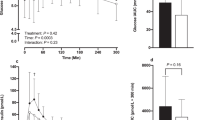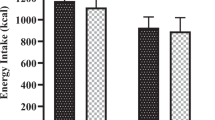Abstract
Background:
Previous studies have indicated that fish protein may have a greater effect on satiety compared to other protein sources of animal origin.
Objective:
To compare the effects of fish protein and beef protein meals on hunger and satiety.
Design:
Twenty-three normal non-smoking, healthy males aged 20–32 years, body mass index 22.5±1.8 (s.d.) kg/m2 participated in a study, with within-subjects design and 1 week between test days. In the morning of the test days, subjects received a standardized breakfast. Four hours after breakfast, subjects were served an iso-energetic protein-rich (40 energy % protein) lunch meal, consisting of either a fish protein dish or a beef protein dish. Four hours after the start of the lunch meals, an ad libitum standardized evening meal was served and the intake of food was measured. Appetite was rated by visual analogue scales (VAS) immediately before and after the meals, as well as every hour between the meals. After the evening meal until bedtime, subjects were asked to record in detail foods and drinks consumed.
Results:
The repeated VAS-ratings of hunger, satiety and prospective consumption were modelled in a random effects model, taking pre-lunch VAS-ratings into account. After the fish meal, the point estimates were lower for hunger (−2±4.8), higher for satiety (8.7±6.0) and lower for prospective consumption (−4.9±4.7), but they did not reach statistical significance (Psatiety=0.88; Phunger=0.15; Pprospective=0.30). However, the energy intake at the evening meal displayed significant differences with subjects eating less after the fish protein lunch (2765 vs 3080 KJ, P<0.01) without feeling less satiated. No later energy compensation after the evening meal was found on the test day.
Conclusion:
Although no significant differences in VAS-ratings of satiety or hunger were detected, subjects displayed an 11% reduction in energy intake at the subsequent evening meal.
This is a preview of subscription content, access via your institution
Access options
Subscribe to this journal
Receive 12 print issues and online access
$259.00 per year
only $21.58 per issue
Buy this article
- Purchase on Springer Link
- Instant access to full article PDF
Prices may be subject to local taxes which are calculated during checkout



Similar content being viewed by others
References
Barkeling B, Rossner S, Sjoberg A 1995. Methodological studies on single meal food intake characteristics in normal weight and obese men and women. Int J Obes Relat Metab Disord 19, 284–290.
De Graaf C, De Jong LS, Lambers AC 1999. Palatability affects satiation but not satiety. Physiol Behav 66, 681–688.
Eisenstein J, Roberts SB, Dallal G, Saltzman E 2002. High-protein weight-loss diets: are they safe and do they work? A review of the experimental and epidemiologic data. Nutr Rev 60, 189–200.
Hall WL, Millward DJ, Long SJ, Morgan LM 2003. Casein and whey exert different effects on plasma amino acid profiles, gastrointestinal hormone secretion and appetite. Br J Nutr 89, 239–248.
Holt SH, Miller JC, Petocz P, Farmakalidis E 1995. A satiety index of common foods. Eur J Clin Nutr 49, 675–690.
Karlsson J, Persson LO, Sjostrom L, Sullivan M 2000. Psychometric properties and factor structure of the Three-Factor Eating Questionnaire (TFEQ) in obese men and women. Results from the Swedish Obese Subjects (SOS) study. Int J Obes Relat Metab Disord 24, 1715–1725.
Rogers PJ, Blundell JE 1990. Umami and appetite: effects of monosodium glutamate on hunger and food intake in human subjects. Physiol Behav 48, 801–804.
Sorensen LB, Moller P, Flint A, Martens M, Raben A 2003. Effect of sensory perception of foods on appetite and food intake: a review of studies on humans. Int J Obes Relat Metab Disord 27, 1152–1166.
Uhe AM, Collier GR, O'Dea K 1992. A comparison of the effects of beef, chicken and fish protein on satiety and amino acid profiles in lean male subjects. J Nutr 122, 467–472.
Warwick ZS, Hall WG, Pappas TN, Schiffman SS 1993. Taste and smell sensations enhance the satiating effect of both a high-carbohydrate and a high-fat meal in humans. Physiol Behav 53, 553–563.
Westerterp-Plantenga MS 2003. The significance of protein in food intake and body weight regulation. Curr Opin Clin Nutr Metab Care 6, 635–638.
Yeomans MR, Caton S, Hetherington MM 2003. Alcohol and food intake. Curr Opin Clin Nutr Metab Care 6, 639–644.
Author information
Authors and Affiliations
Corresponding author
Additional information
Guarantor: S Rössner.
Contributors: BB and SR designed the study. SB designed and cooked the test meals. BB and SB recruited subjects and collected data. ATP and MN conducted the statistical analyses. BB wrote the initial manuscript draft, assisted by SR. None of the authors had any personal or financial conflicts of interest with regard to the study.
Rights and permissions
About this article
Cite this article
Borzoei, S., Neovius, M., Barkeling, B. et al. A comparison of effects of fish and beef protein on satiety in normal weight men. Eur J Clin Nutr 60, 897–902 (2006). https://doi.org/10.1038/sj.ejcn.1602397
Received:
Revised:
Accepted:
Published:
Issue Date:
DOI: https://doi.org/10.1038/sj.ejcn.1602397
Keywords
This article is cited by
-
The acute effects of insect vs. beef-derived protein on postprandial plasma aminoacidemia, appetite hormones, appetite sensations, and energy intake in healthy young men
European Journal of Clinical Nutrition (2022)
-
Amino acid and fatty acid profile and digestible indispensable amino acid score of pasta fortified with salmon (Oncorhynchus tshawytscha) powder
European Food Research and Technology (2018)
-
Influence of rice, pea and oat proteins in attenuating glycemic response of sugar-sweetened beverages
European Journal of Nutrition (2018)
-
Public Health Perspectives on Aquaculture
Current Environmental Health Reports (2014)
-
Development of a combined SEM and ICP-MS approach for the qualitative and quantitative analyses of metal microparticles and sub-microparticles in food products
Analytical and Bioanalytical Chemistry (2011)



